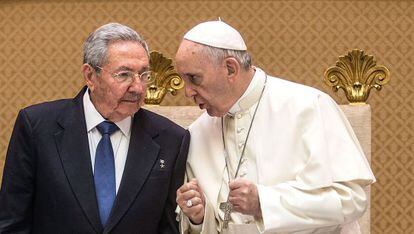Castro thanks pope for helping US and Cuba patch up relations
Cuban leader says he'll return to Catholic Church if pontiff “continues like this”

After a 55-minute private meeting with Pope Francis on Sunday, Cuban President Raúl Castro said he was grateful for the pontiff’s brokering of a behind-the-scenes agreement that has led to the re-establishment of bilateral relations between Washington and Havana.
At a news conference with Italian Prime Minister Matteo Renzi, Castro said he was “very impressed” with the pope’s “wisdom, his modesty, and all the virtues that we know he has.”
If he keeps talking like this, I will start to pray once more and I’ll come back to the Catholic Church. And I’m not joking” Raúl Castro
“I read all of the pope’s speeches,” Castro said. “If he keeps talking like this, I will start to pray once more and I’ll come back to the Catholic Church. And I’m not joking.”
The pope is planning on visiting Cuba in September.
Castro’s impressions after meeting with the pontiff were similar to those of US President Barack Obama, who visited the Vatican last year.
“We know that, given his great moral authority, when the pope speaks his words have an enormous weight,” Obama told the Italian daily Corriere della Sera in March 2014.
After their meeting, Castro and the pontiff exchanged gifts in front of the cameras. The Argentinean-born pope gave him a medal of French Saint Martin of Tours, the patron of Buenos Aires, while Castro presented him with a painting representing Cuban migration.
The pope’s travels, which will begin on September 22, will also take him to Washington, New York and Philadelphia.
It is unclear whether he will stay just one day in Havana or visit other Cuban cities.
For their part, Vatican officials are anxious to know whether the Cuban government will allow its citizens to freely attend a Mass the pope hopes to hold while on the Communist island.
On Sunday Castro did promise to attend all “the Masses” the pontiff will officiate, and declared himself “a Jesuit like the pope” because he attended schools run by the priests’ order as well as regularly going to church services.
Vatican officials are anxious to know whether Cuba will allow its citizens to freely attend a Mass by the pope
But at the same time, Vatican diplomatic sources fear that Cuban authorities will use the pope’s visit as an approval of their continued control over the island.
“The visits by the popes to Cuba have always been delicate affairs, a game of balance between the revolutionary government and the Holy See,” said a top Vatican diplomatic official.
“Until now, the Church’s interest was to remain in the island to push for – in an almost invisible way – openness and dialogue between the government and the opposition. Soon, and thanks to those efforts and the encouragement by the pope and Barack Obama, history will change. But for that reason, we must be very cautious and more respectful toward the regime, which doesn’t want to feel like it was defeated.”
The visits by the popes to Cuba have always been delicate affairs” Vatican diplomatic official
Sunday’s visit by Raúl Castro to the Vatican was not the first. In 1997, he met with Pope John Paul II while serving as defense minister to prepare for the pontiff’s historic visit to Cuba in January the following year.
“Let Cuba open up to the world and the world open up to Cuba,” said the Polish pope at the time.
That mutual opening-up, which has been the dream of so many Cubans for so long, finally appears to be happening. Obama and Raúl Castro appear willing to put their signatures below a phrase that Pope Francis often cites: “Negotiating peace requires greater bravery than waging war. You need to be much more brave to say yes to dialogue and no to violence.”
80 years of diplomatic relations
1935. Diplomatic ties are established between Havana and the Vatican
1961. After the 1959 Revolution, 131 priests are expelled from the island
1976. The Cuban Constitution officially separates the church and state
1991. The Communist Party allows practicing Catholics to join its ranks
1996. Fidel Castro meets with Pope John Paul II at the Vatican
1998. John Paul II visits Cuba and the Castro government recognizes Christmas as an official holiday
2012. Pope Benedict XVI travels to Cuba and defends freedom of expression but also criticizes the US trade embargo
2014. Pope Francis personally brokers a diplomatic deal that leads to the establishment of US-Cuban relations










































